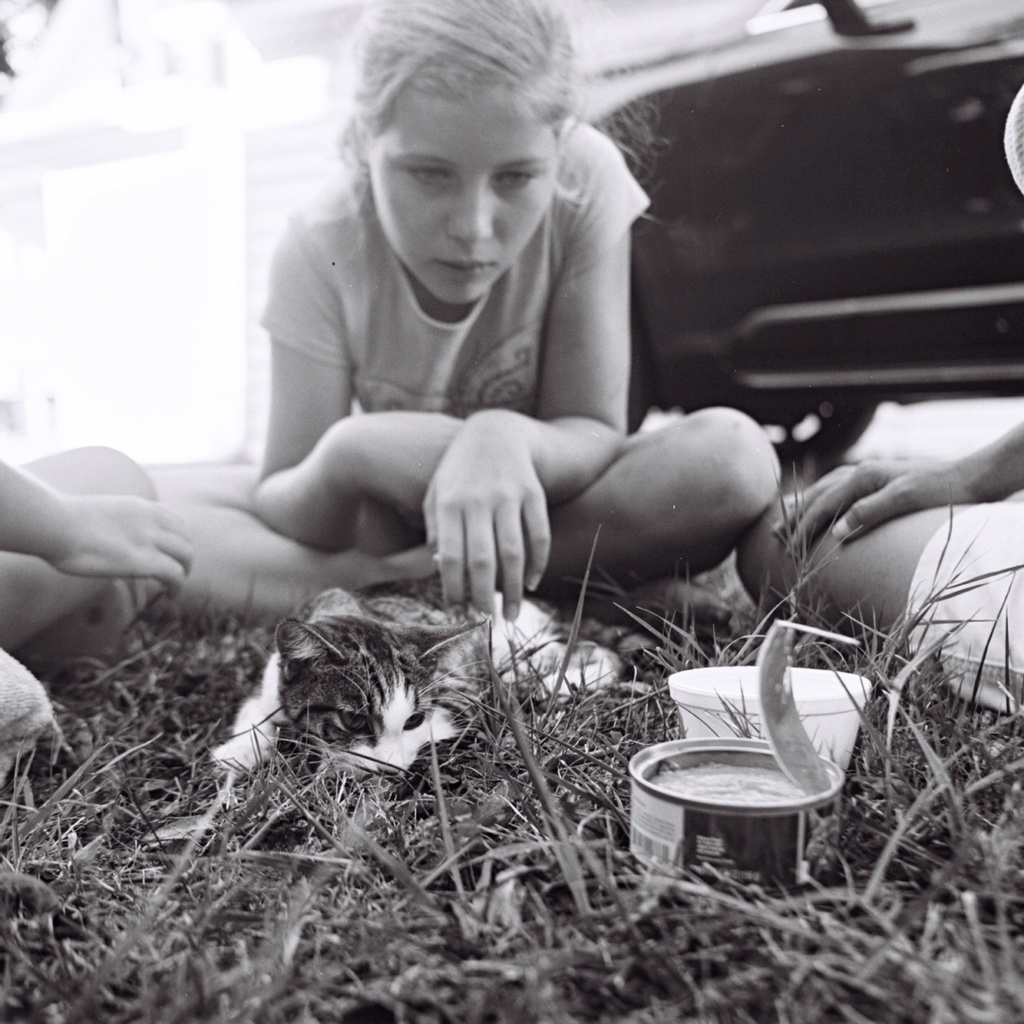
We got to our family’s farm in Virginia after a 6 hour drive, aware that M’lou’s sick kitten Chloe had taken a turn for the worse in the car. We thought fresh air and water would revive her, but when we put her on the grass with some water and food she took a step toward it and collapsed. It looked clear she wasn’t going to make back to Brooklyn for the appointment she had at the vet two days later, even if she lasted the night.
It was an almost ridiculously beautiful evening—dry and cool after a hot muggy day of driving—and we sat in the front yard, huddled around her barely moving body as she lay on a purple towel. There was nothing to eat in the house and not much in town so we ate Pizza Hut and watched her tail twitch and her eyes move but those movements—which had initially struck the girls at least as signs of life and reasons for hope or sources of consolation—quickly began to look to all of us like the first twitches of death. M’lou said it felt weird to be eating next to her, especially Pizza Hut, but we ate anyway (and we had to admit, also, that it was good, much better than we remembered or expected).
Jennifer found an emergency clinic near Richmond that could take her in and we all brought ourselves around to the reality that she needed to be put out of her pain. I explained to M’lou that “euthanasia” came from the Greek for “good death” (or so I thought at the time–I still haven’t checked) and she said “why do all our important words come from somewhere else?”
To get that good death, though, we would have to drive 45 minutes–back in the car, still warm and stale from a day’s drive–to a sterile room in an all-night clinic. We’d hand her over to strangers. Her body would be taken away and mailed back to us weeks later, ashes in a decorative tin. I kept hoping she would die on the grass in the front yard and that we could just bury her there. I thought about calling my uncle to see whether there was a rifle in the house. I’d done that job before, even as a kid, but in this case–the thought of the girls standing in a bedroom and hearing that rifle crack ring across the field, the thought of me standing in a field with a rifle barrel against a kitten’s tiny body—the scene was too much to imagine. And the reality that we’d have to explain to M’lou that if we didn’t bury her here we’d have to put her in a ziploc bag in the freezer and save her for a week—that absurd situation, trying to keep corpse cold over hundred of miles of summer driving, also felt too much.
But the end we faced in fact was also ridiculous. The clinic was nearly empty, only an old golden retriever with a sprained ankle in the waiting room, tugging at his leash as his owners tried to settle their bill. On the TV Guy Fieri was playing, his sunglasses pasted inexplicably to the back of his head as he raved over galangal and scallops and sucked his fat fingers. We filled out paperwork and looked over the check-in log at the other animals who’d been brought in that day. Reason for Visit: wasp sting. Snake bite. Penis problem. Jennifer took the pen and wrote “euthanasia.”
I left the girls in the waiting room and went back to an examination room. The gentle vet tech brought me Chloe wrapped in a fleece blanket, a catheter held to her foreleg by a few twists of purple gauze. She was stiff with pain, her gums gray and her teeth turning black, her mouth open, her breathing raspy and labored. She gasped when I moved her. There were signs for grief counseling on the walls of the room.
I started writing this because I wanted to get to this: are all scenes of death both heartbreaking and absurd? It’s hard to know how sad you should feel as a grown man over the death of a kitten in your arms, or how sad you should acknowledge feeling. And how even your own assessment of your sadness feels awkward and self-conscious and absurd. I suppose self-consciousness is inevitable at the moment of death, as you watch a spirit separate from the messy life you’ll have to go on living. Even the spirit moving on from the body of a kitten can remind you of that.
“Jubilate Agno, Fragment B, [For I will consider my Cat Jeoffry]“, Christopher Smart